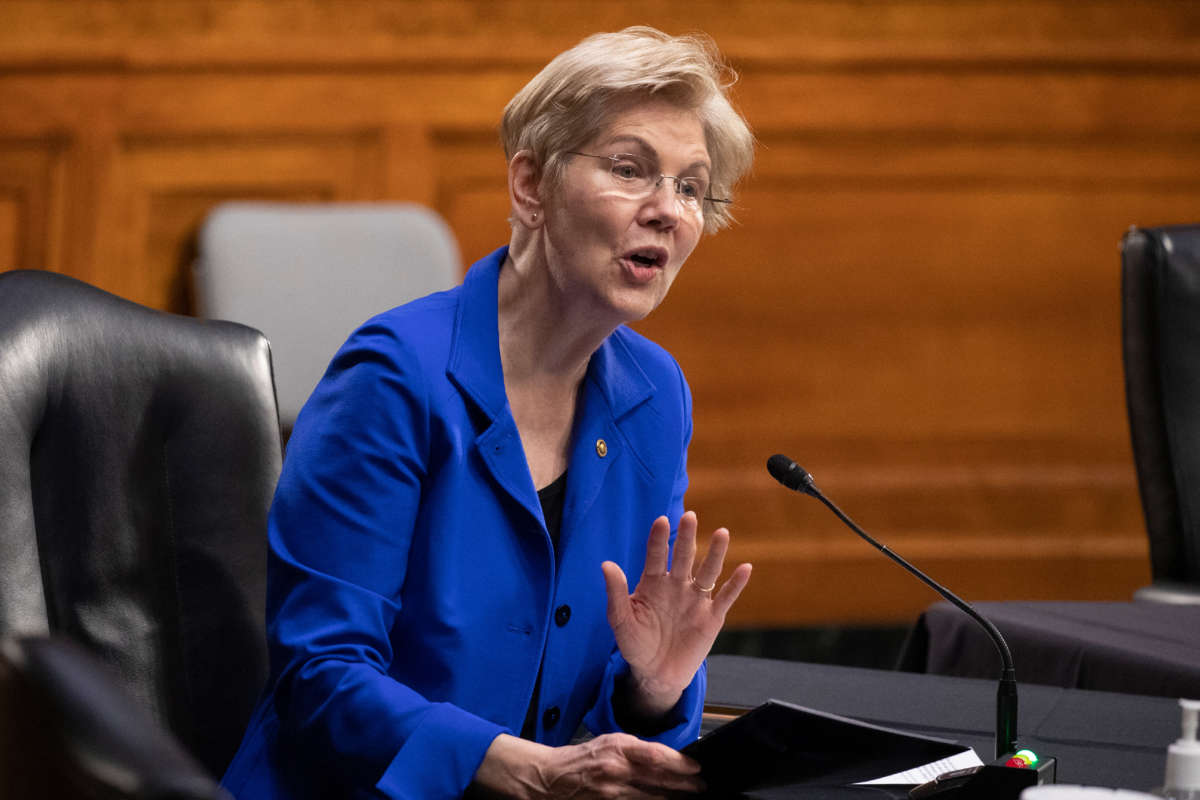Part of the Series
The Struggle for Caregiving Equity
A new report prepared for Sen. Elizabeth Warren (D-Massachusetts) and her fellow Democratic members of Congress finds wide-ranging impacts on the economy due to many workers’ lack of access to child care. Many of these economic burdens could be relieved, the report says, by Warren’s $700 billion universal child care proposal.
The report prepared by Capitol Hill staff finds that restrictions placed on accessing quality, affordable child care are especially harming women as many people struggle to work and take care of children during COVID-19. Women of color feel the brunt of the impacts, the report finds.
Nearly 20 percent of parents stopped working or reduced their hours due to a lack of child care during the pandemic, including 26 percent of women who attribute their unemployment to the same reason.
“Now, in order for families to return to work, they need safe, reliable, and affordable child care,” the report authors write. “Our economic recovery depends on supporting parents by ensuring that every family who needs it can find affordable, high-quality care for their children.”
The pandemic caused nearly 10 million mothers with school-age children to leave the workforce, says the report. This can have long-term effects on these families’ financial health as the women may face less earnings potential in the future due to their loss of employment.
“If we want families to go back to work as this pandemic subsides, we need to invest $700 billion to fix our broken child care system — these investments will help ensure that women and families are not left behind in our recovery and will create jobs, increase productivity, and have lifelong benefits for children’s development and growth,” said Warren, who recently introduced a plan to implement universal child care, in a statement.
Meanwhile, a recent report by the National Women’s Law Center and Columbia researchers found that expanding access to child care could increase lifetime earnings for women with two children by about $94,000, and substantially bolster their financial security and Social Security benefits.
On the other hand, the economic consequences of not providing women the support they need to return to work could harm the economy at large. The report authors cite a previous report from 2020, which found that the risk of women leaving the workforce or reducing work hours to take care of children could result in loss of wages and economic activity amounting to $64.5 billion per year.
Researchers have found, too, that restrictions placed by lack of access to child care could be contributing to the so-called worker shortage that many employers have begun complaining about in recent weeks. But, even as states launch desperate and unproven bids to get people back to work by cutting unemployment benefits, that “won’t solve the child care crisis,” writes Andrew Stettner for the Century Foundation.
“Of the eighteen states that have cut off pandemic benefits, only six allow for state unemployment benefits in situations when child care is not available — leaving no safety net for many working parents,” Stettner wrote last week. “The employer segments complaining the most about employer shortages should be training their attention on working with their governors to resolve child care issues in their states if they want workers to be available for jobs.”
Even before the pandemic, there was already a dearth of child care. A 2018 report by the Center for American Progress found that about half of Americans live in a so-called “child care desert,” or an area where the population of children far outweighs availability of child care facilities. Moreover, child care facilities are often significantly underfinanced and understaffed, despite the fact that child care costs are so high as to be completely unaffordable for many families.
To help solve the child care shortage, Warren, along with Rep. Mondaire Jones (D-New York), has introduced a universal child care bill that would create a network of child care providers across the country and ensure that low- and middle-income families can access the service for free or at a cost that doesn’t create an unreasonable burden.
Warren and Jones’s plan, the Universal Child Care and Early Learning Act, rivals President Joe Biden’s child care proposals in his American Families Plan, released last month. Biden’s plan includes a provision to ensure families don’t have to spend more than 7 percent of their income on child care, but it doesn’t go so far as to address the issue of shortage of available care facilities, nor does it ensure access to care as Warren and Jones’s plan does.
Correction: This story has been updated to clarify that the child care report cited was prepared by Hill staff.
We have 10 days to raise $50,000 — we’re counting on your support!
For those who care about justice, liberation and even the very survival of our species, we must remember our power to take action.
We won’t pretend it’s the only thing you can or should do, but one small step is to pitch in to support Truthout — as one of the last remaining truly independent, nonprofit, reader-funded news platforms, your gift will help keep the facts flowing freely.
